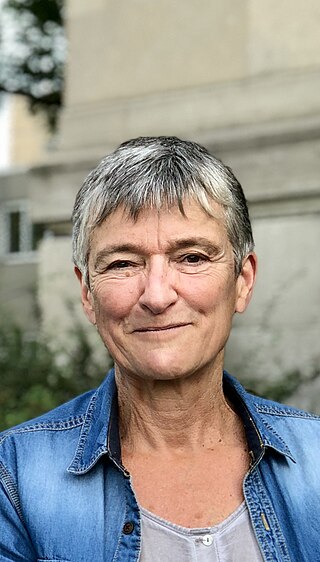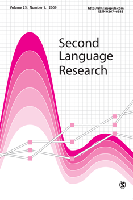Language acquisition is the process by which humans acquire the capacity to perceive and comprehend language. In other words, it is how human beings gain the ability to be aware of language, to understand it, and to produce and use words and sentences to communicate.

Jerome Seymour Bruner was an American psychologist who made significant contributions to human cognitive psychology and cognitive learning theory in educational psychology. Bruner was a senior research fellow at the New York University School of Law. He received a BA in 1937 from Duke University and a PhD from Harvard University in 1941. He taught and did research at Harvard University, the University of Oxford, and New York University. A Review of General Psychology survey, published in 2002, ranked Bruner as the 28th most cited psychologist of the 20th century.

Multilingualism is the use of more than one language, either by an individual speaker or by a group of speakers. It is believed that multilingual speakers outnumber monolingual speakers in the world's population. More than half of all Europeans claim to speak at least one language other than their mother tongue; but many read and write in one language. Being multilingual is advantageous for people wanting to participate in trade, globalization and cultural openness. Owing to the ease of access to information facilitated by the Internet, individuals' exposure to multiple languages has become increasingly possible. People who speak several languages are also called polyglots.

The Journal of Hellenic Studies is an annual peer-reviewed academic journal covering research in Hellenic studies. It also publishes reviews of recent books of importance to Hellenic studies. It was established in 1880 and is published by Cambridge University Press on behalf of the Society for the Promotion of Hellenic Studies. The editor-in-chief is Lin Foxhall. According to the Journal Citation Reports, the journal has a 2022 impact factor of 0.1.

Lydia White is a Canadian linguist and educator in the area of second language acquisition (SLA). She is James McGill Professor Emeritus of Linguistics at McGill University.
The critical period hypothesis is a theory within the field of linguistics and second language acquisition that claims a person can only achieve native-like fluency in a language before a certain age. It is the subject of a long-standing debate in linguistics and language acquisition over the extent to which the ability to acquire language is biologically linked to developmental stages of the brain. The critical period hypothesis was first proposed by Montreal neurologist Wilder Penfield and co-author Lamar Roberts in their 1959 book Speech and Brain Mechanisms, and was popularized by Eric Lenneberg in 1967 with Biological Foundations of Language.

Bilingualism: Language and Cognition is a quarterly peer-reviewed academic journal of linguistics focusing on the study of multilingualism, including bilingual language competence, perception and production, bilingual language acquisition in children and adults, neurolinguistics of bilingualism, and non-linguistic cognitive processes in bilinguals. The journal is published by Cambridge University Press and was co-established by François Grosjean in 1998.

The Web of Science is a paid-access platform that provides access to multiple databases that provide reference and citation data from academic journals, conference proceedings, and other documents in various academic disciplines. Until 1997, it was originally produced by the Institute for Scientific Information. It is currently owned by Clarivate, and currently contains 79 million records in the core collection and 171 million records on the platform.

Modern Asian Studies is a bimonthly peer-reviewed academic journal in the field of Asian studies, published by Cambridge University Press. The journal was established in 1967 by the Syndics of the University of Cambridge and the Committee of Directors at the Centre of South Asian Studies (CSAS), a joint initiative among SOAS University of London, University of Cambridge, University of Hull, University of Leeds, and University of Sheffield. The journal covers the history, sociology, economics, and culture of modern Asia.
Heritage language learning, or heritage language acquisition, is the act of learning a heritage language from an ethnolinguistic group that traditionally speaks the language, or from those whose family historically spoke the language. According to a commonly accepted definition by Valdés, heritage languages are generally minority languages in society and are typically learned at home during childhood. When a heritage language learner grows up in an environment with a dominant language that is different from their heritage language, the learner appears to be more competent in the dominant language and often feels more comfortable speaking in that language. "Heritage language" may also be referred to as "community language", "home language", and "ancestral language".
The silent period is a phase reported to have been observed in second-language acquisition where the learner does not yet produce but is actively processing the L2. This silent period has been claimed to be typically found in children and has been called the second stage of second language acquisition, following the use of L1 and preceding productive use of L2, and can last between a few weeks to a year. Generalizing how long this period may last is nearly impossible because it depends on many personal and individual variables that come into play.

Second Language Research is a peer-reviewed academic journal in the field of linguistics, concerned foremost with second language acquisition and second-language performance. Each year, one special issue is published, devoted to some current topic. It was established in 1985 and is published quarterly by SAGE Publications. The current editors-in-chief are Silvina Montrul and Roumyana Slabakova.

Language Teaching Research is a peer-reviewed journal that publishes research within the area of second or foreign language teaching. Although articles are written in English, the journal welcomes studies dealing with the teaching of languages other than English as well. The journal's editors-in-Chief are Hossein Nassaji and María del Pilar García Mayo. The journal was established in 1997 and is currently published by SAGE Publications. The journal is a venue for studies that demonstrate sound research methods and which report findings that have clear pedagogical implications. A wide range of topics in the area of language teaching is covered, including:Programme Syllabus Materials design Methodology The teaching of specific skills and language for specific purposes

Language Learning: A Journal of Research in Language Studies is a peer-reviewed academic journal published quarterly by Wiley-Blackwell on behalf of the Language Learning Research Club at the University of Michigan. The editor-in-chief is Nick C. Ellis University of Michigan.
TESOL Quarterly is a quarterly peer-reviewed academic journal published by Wiley-Blackwell on behalf of TESOL International Association. It covers English language teaching and learning, standard English as a second dialect, including articles on the psychology and sociology of language learning and teaching, professional preparation, curriculum development, and testing and evaluation. The editors-in-chief are Charlene Polio and Peter De Costa, both at Michigan State University. TESOL also publishes TESOL Journal.
The following outline is provided as an overview of and topical guide to second-language acquisition:
Complex dynamic systems theory in the field of linguistics is a perspective and approach to the study of second, third and additional language acquisition. The general term complex dynamic systems theory was recommended by Kees de Bot to refer to both complexity theory and dynamic systems theory.

Marjolijn Verspoor is a Dutch linguist. She is a professor of English language and English as a second language at the University of Groningen, Netherlands. She is known for her work on Complex Dynamic Systems Theory and the application of dynamical systems theory to study second language development. Her interest is also in second language writing.

Diane Larsen-Freeman is an American linguist. She is currently a Professor Emerita in Education and in Linguistics at the University of Michigan in Ann Arbor, Michigan. An applied linguist, known for her work in second language acquisition, English as a second or foreign language, language teaching methods, teacher education, and English grammar, she is renowned for her work on the complex/dynamic systems approach to second language development.
Alison Mackey is a linguist who specializes in applied linguistics, second language acquisition and research methodology and is one of the most highly cited scholars in the world in these areas.












